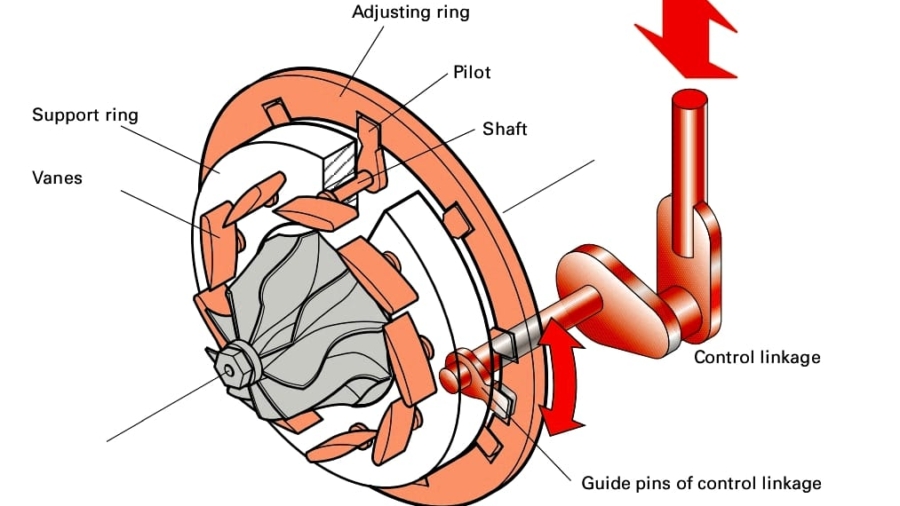Ever wondered how some modern engines deliver a powerful punch even at low RPMs? The answer often lies in a clever piece of engineering: the adjustable turbocharger. Unlike older turbochargers that might feel a bit sluggish until the engine really revs up, these advanced systems offer a broad band of power, ensuring you get that boost precisely when you need it.
The Miller's Tale: A Simple Analogy for a Complex System
Imagine a traditional mill stream. If the water level drops, the current isn’t strong enough to turn the water wheel and grind corn. What does the miller do? They narrow the stream of water. This forces the water to flow faster, generating enough power to turn the wheel.
This simple principle is at the heart of the adjustable turbocharger. Just as the stream is vital to the miller, exhaust gas energy is crucial to the turbocharger. By manipulating the flow of exhaust gas, the adjustable turbocharger ensures optimal performance across the entire engine speed range.
More Than Just "On" or "Off": The Adjustable Advantage
Traditional turbochargers often rely on a bypass valve to regulate boost at high engine speeds. While effective, this approach can leave a “flat spot” at lower RPMs where the turbo hasn’t fully spooled up.
The adjustable turbocharger, however, features adjustable vanes that surround the turbine wheel. Think of them like tiny, precise gates. These vanes can change the cross-section of the exhaust gas flow upstream of the turbine wheel. This revolutionary design allows the turbocharger to produce the necessary compression not only at the top end of the speed range but across the full speed range.
How It Works: Low Speed Vs. High Speed
Low Engine Speed: Quick Boost When You Need It
When your engine is running at low speeds and you need a quick build-up of charge pressure (for example, when you accelerate from a standstill or are driving under full load), the vanes are set to a narrow inlet cross-section.
This restriction forces the exhaust gas to accelerate rapidly as it passes through. This increased flow velocity spins the turbine wheel faster, even at low engine RPMs, generating the required high charge pressure. The trade-off here is a temporarily higher exhaust gas backpressure.
High Engine Speed: Maintaining Optimal Pressure
As the engine speed increases, the volume of exhaust gas also increases. To prevent over-boosting and maintain the optimal charge pressure, the turbocharger cross-section adapts to the exhaust gas flow.
The vanes open up, creating a larger inlet cross-section. This allows the entire exhaust gas flow to pass through the turbine without excessive restriction, ensuring that the required charge pressure isn’t exceeded. Crucially, the exhaust gas backpressure drops in this scenario, improving engine efficiency.
The Mechanics of Adjustment: Precision Control
The adjustable vanes are precisely fitted onto a supporting ring with shafts. A clever guide pin engages in an adjusting ring, allowing all vanes to be rotated simultaneously and at the same rate. This adjusting ring is, in turn, controlled by a low-pressure box via a control linkage.
For fine-tuning and continuous optimization, a sophisticated vacuum control system is employed. A solenoid valve, driven by the engine control unit, precisely adjusts the vacuum level. This vacuum directly corresponds to the optimal vane angle for specific speed and load ranges. This constant feedback loop means the engine control unit can immediately adapt the vane angle to changing driving conditions, ensuring the turbocharger always delivers the perfect charge pressure.
The Bottom Line
The adjustable turbocharger is a prime example of how clever engineering can significantly enhance engine performance and responsiveness. By mimicking the miller’s ingenuity, these systems provide a continuous and dynamic flow of power, making for a more engaging and efficient driving experience.
RELATED ARTICLES
Maximum Engine Speed Warning in Audi/Porsche
1- Problem with engine oil pressure Low engine oil pressure indicates that there isn't enough oil circulating through your engine at the pro ...
Mercedes Benz Brake Assist System: BAS and BAS PLUS
What is BAS (Brake Assist System) & BAS PLUS (Brake Assist System Plus) In Mercedes Benz BAS (Brake Assist System)When it comes ...




Add a Comment